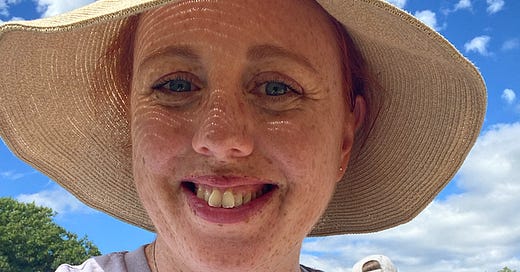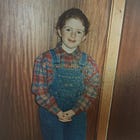🏳️🌈 Why Pride Month still matters
Most people aren't as progressive as they like to think they are
Welcome to Beyond Survival, a publication about life after trauma. Today, I’m sharing a column that was originally published in The Irish Times last year. It’s about the importance of Pride Month, especially in contexts where people assume we’ve already achieved equality. There was so much more I could have written about (trans rights! discrimination against queer families! the increasing rates of hate crime!) but I focused this piece on my own personal experience.


June is Pride Month. For the queer community, it’s a time of celebration, visibility and protest. It’s also an opportunity to remember that while Irish people voted overwhelmingly in support of marriage equality in 2015, we still have a long way to go.
Until recently, I lived in an urban community of young families and occasionally encountered the kind of casual homophobia most people think has been eliminated. It’s easy for straight people to miss the small, jarring moments of erasure. I know; I lived three decades believing I was one of them. Before I lived openly as a queer woman, I didn’t know what I didn’t know.
It wasn’t everyone and it didn’t happen everyday, but it happened enough that I thought twice about reaching for my partner’s hand. Coming from the supermarket one day, I heard a young mother chastise her toddler son by referring to him as a “f*gg*t.” On the Luas1, young teenagers in self-conscious packs screamed gay slurs. As we walked past dogs chasing balls and children playing, that word – and the toxicity it represents – carried in the wind.
As a child, I heard that word a lot. “Gay” was a slur then too; it didn’t mean homosexual, as much as it meant stupid, hideous or disgusting. Growing up in a devoutly Catholic home, being gay wasn’t an option. I could never have imagined a country where 62 per cent of people would vote for marriage equality.
Hatred sticks to your psychic skin like tar. It hardens into fact, dragging you down with its oppressive weight. With time, I peeled off the layers of trauma and found joy in my sexuality. I found my community, fell in love with a woman and discovered a peace I’d never known before.
In my day-to-day life, it’s rare for me to encounter overt bigotry. Unless I disclose my identity or am publicly affectionate with my partner, people rarely assume I’m queer. But there are thousands of little moments that make you feel different.
“Are you sisters?” the nurse asked when my partner and I arrived for our Covid booster. “We’re not sisters, we’re lesbians” is what I wish I’d said2.
Walking past the religious preachers on Henry Street with my partner’s hand in mine, I feel my skin prickle with apprehension.
I’ve muddled through in jobs where I wasn’t safe enough to come out, and navigated awkward moments when strangers assume my partner must be a “he”. During a hospital appointment, a nurse asks about my sex life. She wants to be sure I’m not pregnant before injecting me with radioactive material. According to the medical consent form, the only kind of sex that exists is the kind that could result in a pregnancy.
Many reflexively assume that while rural areas might be more conservative, our cities are bastions of progressive ideals. In my experience, that is not true; all of the examples I’ve cited happened in Dublin. As a queer person in modern Ireland, homophobia remains part of daily life. The most extreme examples garner headlines.
But there are countless other incidents that never make the news but have a profound impact on our community. In particular, our trans siblings struggle to find acceptance in an environment full of hateful misinformation and organised bigotry. Despite how progressive Irish people consider themselves to be, deep pockets of prejudice still exist.
Few straight people know the discrimination queer people still face as parents. Or more precisely, the discrimination faced by the children of queer people who don’t have the same legal relationship with both of their parents. They don’t know how few safe spaces we have to gather, or the challenges of loneliness and social isolation in our community. They don’t know the pain of navigating complicated family dynamics where people are tolerant but frightened. They don’t know what it is to have your identity reduced to your sexuality, to be a token oddity rather than a complex human.
Pride Month is about honouring the queer community in all its complexity and diversity. It allows us to push back against centuries of discrimination which has been threaded through the lives of queer people. It’s also an opportunity for those outside the community to expand their understanding of what it means to be queer.
Pride is a celebration; it’s also a protest. There’s pageantry, glamour and fun but, for many of us, that coexists alongside grief, pain and trauma. Maddeningly, it has also become a corporate event – an opportunity for our identities to be commodified and sold. True to an infuriating capitalistic logic, this is also part of queer life becoming more mainstream.
Last Saturday, my partner and I cheered and danced as the parade meandered through Dublin’s streets. Later that day, we passed a white man on a bike. “Fucking Pride,” he said, followed by a stream of aggression. The disgust in his voice was chilling. Ireland is not as progressive as we like to think it is.
This piece first appeared in The Irish Times in June 2023.
If you enjoyed this essay, you might also appreciate:
💕 If this piece resonated with you, please tap the heart below to help spread the word.
💬 In the comments, I’d love to hear your reflections on the meaning of Pride. How do you celebrate/protest during June? And, what do you do to recover when it’s all over?
💰If you find value in my work, consider becoming a paid subscriber. For a few quid every month, you can make my career more sustainable.
Regardless, I am grateful for your time and attention.
aka Dublin’s tram
My partner is Italian, she speaks with an accent and we look nothing alike. In the nurse's mind, were we sisters who’d been separated at birth? Was that more likely than the thought that we could be lesbians? This conversation happened more than two years ago and I still can't figure it out!







Thank you for this Clare and Happy Pride!!
Either sisters or very good friends. Gal pals. What else could it possibly be, eh? Thanks for your essay and for including trans people, and happy Pride!